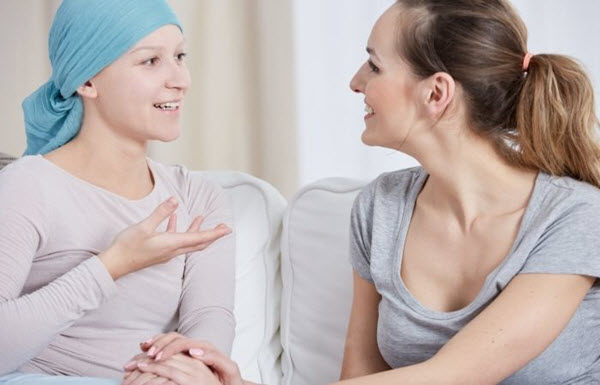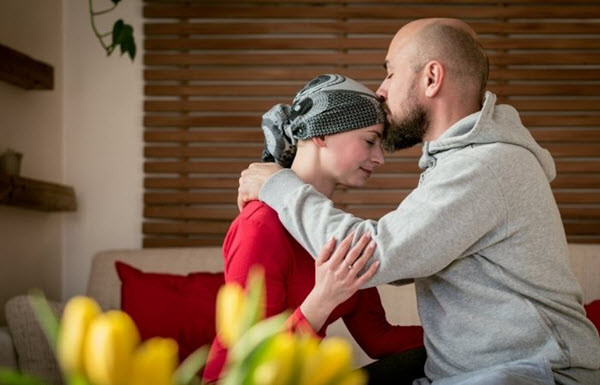It’s almost October. The leaves are showing their vibrant fall colors. Pumpkin spice everything can be found everywhere, and Breast Cancer Awareness Month will soon be underway.
Learning that a friend, family member, or coworker has breast (or any other) cancer is hard. Figuring out what to say next is harder. As a two-time cancer survivor, I know that there are plenty of things not to say to a cancer patient because I’ve heard most of them.
1At least you have a good cancer.
No cancer is a “good” cancer. This is a backhanded way of asking about the patient’s prognosis. Rather than asking for such information, let the individual know that you’re there to listen and let her share what she’s comfortable sharing.
2Cancer isn’t as hard as it used to be.
When I was fourteen years old in 1981 with Hodgkin’s lymphoma, cancer was really hard, especially when I threw up day after day from radiation treatment and couldn’t go to high school. Thirty-five years later when I was forty-nine—a wife, mom of three, and professional—with breast cancer, cancer still was really hard, especially after I lost my hair, had agonizing bone pain, and diarrhea during months of chemotherapy. While advances in cancer treatment have improved over the years, any treatment stinks. It’s okay to say, “This really sucks.” Because it does and thanks for noticing.
3Are you getting the boob job with the tummy tuck?
A lumpectomy or a single or bilateral mastectomy is not a “boob job.” It’s the amputation of some or all of the breast tissue, possibly including nipples, and often resulting in the complete loss of sensation in the chest. Reconstruction, if chosen, may be done with implants or with some form of flap reconstruction where the surgeon may use tissue from other body parts to reconstruct the breasts. These are painful surgeries with fairly long recoveries and leave individuals profoundly changed in their self-identities and in their sex lives. So, not a tummy tuck.
4Does it run in your family? Maybe you should have worked out more.
No one asks for a cancer diagnosis. It’s not anyone’s fault if they get one. Please leave the “should have” lectures at home and avoid attributing an individual’s cancer diagnosis to something they may or may not have done, such as the food they ate, their exercise habits, or family history.
5My mother, sister, friend, grandma . . . had cancer. She died.
Individuals’ cancer experiences and outcomes are different, and these stories may not always be helpful or comforting, particularly if death is involved. Put yourself in the patient’s shoes, would you want someone to say that to you?
6Have you heard about [this new treatment, supplement, anti-cancer diet]?
When I was in treatment, I received much unsolicited advice. I had a great team of medical professionals whom I trusted, and I didn’t want to hear about the latest Internet “cures,” ginger chews for nausea, or turmeric tea’s anti-inflammatory properties. Respect the patient – and her choices.
7I Know How You Feel.
No, you don’t. But, you can ask her how she’s feeling.
8You’re so brave, strong, an inspiration . . .

While not unkind, these expressions discount how individuals with cancer may feel, which, more often than not, may be sad, angry, terrified, and anxious.
9You look great.
Cancer may come with hair loss, weight loss or gain, changes in skin tone, etc. Trust me, the patient knows she doesn’t look great and is probably upset about it. Instead, simply tell the individual how great it is to see her.
10Nothing.

If you’re not sure what to say, then say so. Don’t ghost your friend, family member, or coworker due to your fear or unease. It’s about her, not you.
So what can you do?
Remember that the person with whom you’re speaking is the same person she always has been. Listen or offer words of encouragement and support. Ask what you can do to help them in practical, concrete ways, such as making meals, taking them to appointments, or picking up children from school. Finally, talk to them about something, anything, other than cancer.
If you would like to learn more, read about my journey in my new book
Like this Article? Subscribe to Our Feed!
Christine Shields Corrigan gives voice to the beautiful ordinary in her essays published in literary outlets. Her memoir, Again: Surviving Cancer Twice with Love and Lists, will be released soon and may be pre-ordered here. A graduate of Manhattan College and Fordham University School of Law, Chris teaches creative nonfiction writing and provides writing workshops for cancer support groups. She lives in New Jersey with her family.














